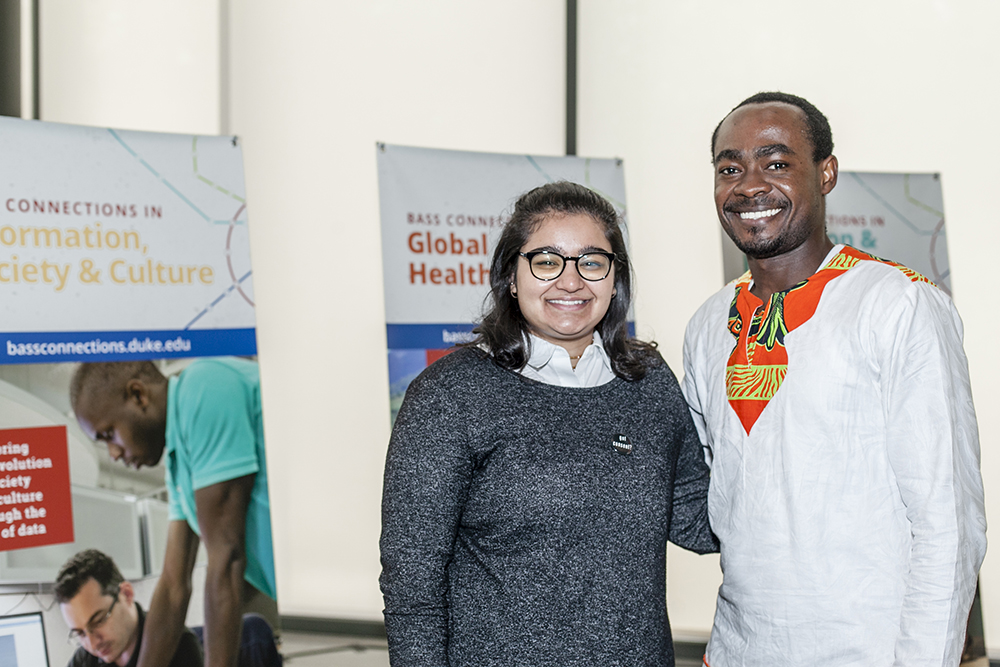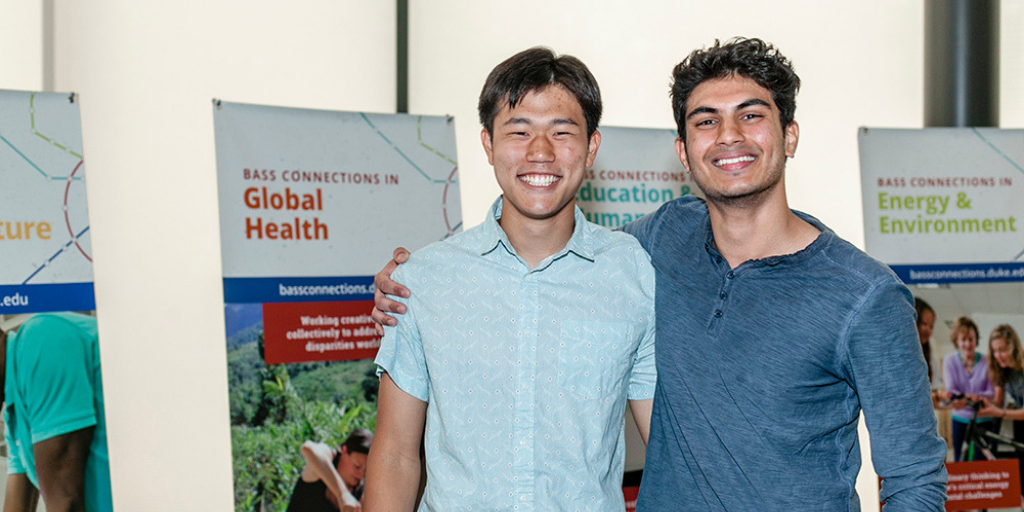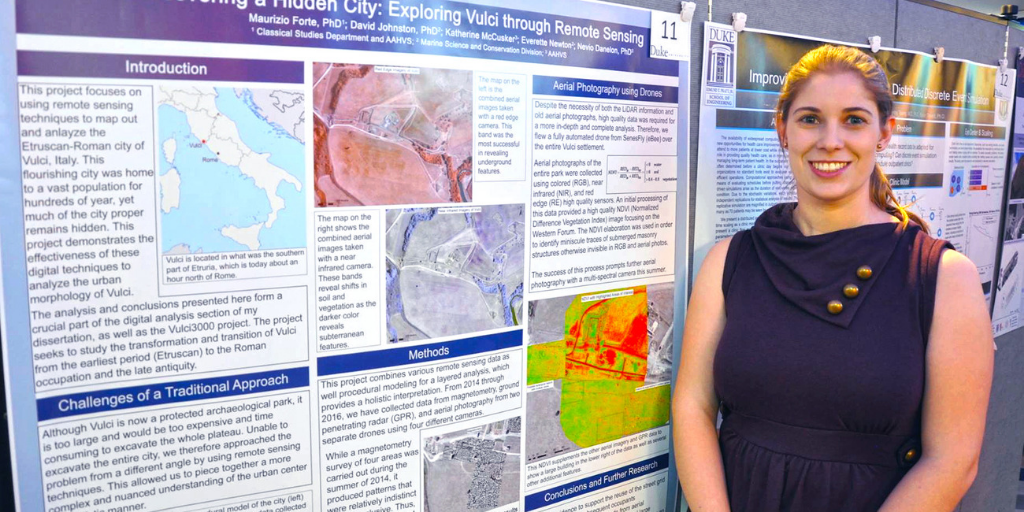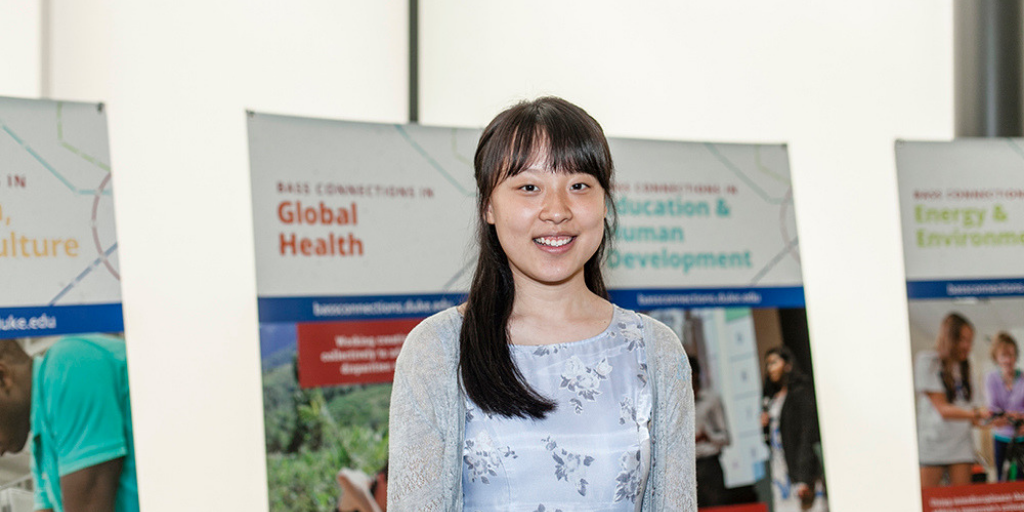Meet the 2019 Recipients of Bass Connections Student Research Awards
May 1, 2019
Five graduate students and 12 undergraduates will pursue faculty-mentored research projects this summer and next year with grant funding from Bass Connections. These projects explore a diverse range of topics, including coastal biodiversity and resilience, geospatial imaging to visualize ancient ruins, the economics and ethics of sports betting and the development of wearable technologies to monitor sleep quality among hospital patients.
Bass Connections Student Research Awards provide support for students to pursue self-directed research projects under the guidance of a faculty mentor. Student projects can be either individual or collaborative in nature, and many projects continue an aspect of research begun on a Bass Connections project team. This year, students will also be pursuing collaborative projects that tackle interdisciplinary challenges that are not directly related to a specific project team’s research.
Alice Chung, Abhi Jadhav, Rohin Maganti and Kamyar Yazdani

Alice Chung ’21 (Neuroscience), Abhi Jadhav ’21 (Biomedical Engineering), Rohin Maganti ’21 (Biomedical Engineering and Global Health) and Kamyar Yazdani ’20 (Biology and Computer Science) plan to use a self-designed sleep-tracking device to raise sleep awareness in centers of care. The device is designed to prevent adverse patient outcomes associated with sleep deprivation. The team of undergraduates was assembled during the 2019 Triangle Health Innovation Challenge and collaborated to build a prototype of their wearable technology – Remedy – that won third place among more than 30 teams.
In 2018-19, Yazdani and Jadhav were members of the Using Machine Learning to Generate Clinical Prediction Rules for Clinical Outcomes in Schizophrenia team. Maganti was a member of the Duke Undergraduate International Genetically Engineered Machine (iGEM) team. The group will be mentored by Susanne Haga, Ziad Gellad and Ann Saterbak.
Poor sleep can adversely impact cognitive, immune, cardiac and respiratory functions, metabolism and pace of recovery from acute diseases and has been closely linked to adverse outcomes, increased hospital stay and mortality in patients. Addressing one of the main causes of hospital sleep deprivation – interruptions by hospital staff – could significantly improve patient outcomes and improve interactions between patients and clinical providers and nurses. The premise of Remedy is to create an environment that can improve the sleep quality of inpatients. To our knowledge, it is the first sleep tracking system that conveys patients’ sleep status to hospital staff in real time through a wearable device. This system enables hospitals to recognize and avoid potential sleep disturbances and thus, enhance their patient care, avoid unnecessary health risks and improve patient-physician interactions.
Melanie Camejo Coffigny

Melanie Camejo Coffigny ’20 (Neuroscience and Gender, Sexuality & Feminist Studies) is a member of the Using Neuroscience to Optimize Digital Health Interventions across Adulthood team, which is evaluating whether positively framed social messages motivate aging adults to be more physically active. Her project will extend the team’s research to include individuals will low levels of depression – a population the current study excludes – in order to examine whether there are differences in the effectiveness of positive messages depending on levels of depressive symptoms. She will be mentored by Gregory Samanez-Larkin and Jaime Castrellon.
My project will use functional magnetic resonance imaging (fMRI) to answer whether positively framed social messages are most helpful to motivate people to be physically active. This hypothesis will be tested by sending daily activity promoting messages to the participants and monitoring their physical activity over the course of nearly three months. The initial neuroimaging measures will be used to predict the effectiveness of [these] social messages on this population’s physical activity…and daily surveys will track changes in their mood and/or energy throughout their participation in the study. The ultimate goal is to help individuals be more physically active in order to improve brain health as people age.
Jessica Coleman, Godfrey Kisigo and Saumya Sao

Doctoral student Jessica Coleman ’24 (Clinical Psychology), master’s student Godfrey Kisigo ’21, M.D. (Global Health) and undergraduate Saumya Sao ’20 (Gender, Sexuality & Feminist Studies and Global Health) plan to examine male involvement in antenatal care and HIV services in Tanzania in order to identify opportunities for couples-based programming in health services. This research was inspired by the work of the Big Data for Reproductive Health team, which has been exploring women’s contraceptive use, including trends and reasons for contraceptive discontinuation and method-switching over time. The group plans to examine these trends alongside gender norms and roles to understand how men’s engagement in reproductive healthcare influences heterosexual couples’ decisions and behaviors, especially in the context of HIV testing and treatment.
In 2018-19, Sao was a member of the Big Data for Reproductive Health’s Bass Connections and Data+ teams. The group will be mentored by Melissa Watt.
In sub-Saharan Africa, men are less likely to test for HIV, and, if confirmed positive, are less likely to link to care and remain in treatment. However, research in Tanzania notes that over half of women attending their first antenatal care visit come with a male partner, providing an important opportunity to engage male partners in order to improve linkage to care among men who test positive for HIV and to support prevention of mother-to-child transmission of HIV care among women…Furthermore, it is important to determine where there are opportunities within existing healthcare infrastructure for gender-transformative approaches [to reproductive healthcare] to mitigate gender power imbalances among heterosexual couples.
Alexandra DiGiacomo

Alexandra DiGiacomo ’20 (Biology) is a member of the Developing Rapid, Cost-effective Methods for Evaluating Coastal Biodiversity and Resilience team, which is using drone-based remote sensing methods to assess habitat health and biodiversity in natural and restored salt marshes along the North Carolina coast. Her project will expand on the team’s research, extending the study to six new sites in order to evaluate different growth dynamics across tidal ranges and estuarine salinity gradients and refine the team’s data collection methodology and workflow. She will be mentored by David Johnston and Justin Ridge.
Salt marshes along the southeastern Atlantic coast defend against shoreline erosion, prevent water contamination and support healthy fish stocks. While the need to monitor this habitat grows in the face of increased coastal development and pollution, traditional monitoring methods rely on manual data collection that tramples the marsh and results in plant death, root destruction and over-compacting of the soil structure. My project will use unmanned aerial vehicle (UAV) imagery and sensor data to construct models of the marsh’s vegetated canopy. Multi-spectral data collected by the UAV can be used to look at plant stress and track the progression of dieback over time. This UAV monitoring can ultimately provide a framework for conservation organizations and researchers with a rapid, environmentally conscious workflow for understanding current rates of habitat loss and vulnerability, as well as the success of restored salt marshes.
Courtni France

Master’s student Courtni France (Bioethics & Science Policy) is a member of the Social-ecological Networks and Zoonotic Disease in Rural Madagascar team, which is investigating the links between biodiversity, agriculture, infectious diseases and human health in the region around Marojejy National Park in northeastern Madagascar. Her project will expand on the team’s research by evaluating the relationship between sustainable agriculture programs, human health and conservation. Specifically focused on the vanilla industry, France will examine how sustainable vanilla certification programs, which offer benefits to farmers such health insurance, may alleviate the financial burden of accessing healthcare and promote sustainable agriculture and development. She will be mentored by Randall Kramer and Charles Nunn.
Vanilla is an important cash crop in Madagascar and particularly significant to the region in which I will work. My overall goal is to assess the impact of vanilla certification programs on health, which can be investigated by examining health insurance access and infectious disease exposure risk among vanilla farmers. I have three primary aims: 1) to assess health-seeking habits and document perceived barriers to healthcare in villages surrounding Marojejy National Park; 2) to compare the heath seeking behaviors of farmers in certification programs who have insurance to those who are not in certification programs and do not have insurance; and 3) to quantify the healthcare infrastructure by mapping healthcare facilities and the quality of these facilities. These simultaneous projects will reveal the potential impact of sustainability, promoted through insurance incentives, on health and health-seeking behaviors.
Irene Koc

Irene Koc ’20 (Neuroscience) is a member of the Exercise Therapy and Brain Health team, which is exploring the molecular and cellular effects of exercise on female brain neuroanatomy and function using a mouse model of Alzheimer’s disease. Her project will expand on the team’s research by examining the expression of genes in the forebrain that are deleteriously affected by the loss of ovarian function and the onset of Alzheimer’s disease to determine if any of these gene changes can be reverse or mitigated by exercise during or after menopause. She will be mentored by Christina Williams.
Through this research project, I will learn how to extract RNA from our frozen brain samples and learn to analyze gene expression using microarrays. I will help design these microarrays by targeting and selecting genes that are known to be influenced by estrogen and alter memory and neuronal plasticity in order to examine possible shared pathways and genetic networks among these processes. I hypothesize that physical exercise can both decrease expression of particular proteins and increase gene expression of those genes associated with memory and learning, therefore attenuating the onset and progression of AD and its exacerbation by menopause.
Jason Kwak and Neelesh Pandey

Jason Kwak ’21 (Public Policy Studies) and Neelesh Pandey ’21 (Political Science) plan to examine the ethics and economics of sports betting, exploring the measures sports leagues take to recognize, categorize and combat unethical incentives. The duo plans to produce three case studies, each centered around a single sport – basketball, baseball and electronic gaming (e-sports) – and will then aggregate their findings into a comprehensive model of the differences between each sector. This project continues the work of the Cheating, Gaming and Rule-fixing team, through which Kwak and Pandey have been examining different institutional approaches to compliance with the rules and norms of fair play. They will be mentored by Wayne Norman.
Sports betting will be incredibly important in the near future due to the Supreme Court’s 2018 ruling that the federal government does not have the right to prohibit state-sanctioned sports gambling. The legalization of sports betting will open a Pandora’s box of ethical problems. When sports betting becomes legal in a state, millions of dollars will pour into the industry, either through new channels or the conversion of former black-market options. We want to understand how stakeholders will behave when these channels open. How will they weigh being incentivized to break or bend the rules? Will the pertinent institutions involved be able to create rules and effective enforcement mechanisms to ensure fair play? We will examine these ethical dilemmas and explore the role each individual party plays in maintaining fair, ethical competition.
Melissa Marchese

Melissa Marchese ’21 (Environmental Sciences) is a member of the Environmental Epidemiology in Latin America team, which has been exploring the health and environmental impacts of mercury exposure due to artisanal and small-scale gold mining in Peru, since 2013. Her project will extend the team’s research by examining mercury contamination in major food sources for villages along the Madre de Dios river, including eggs and meat from local chickens. Her research will enable the team to determine the extent to which consuming chicken could be exposing humans to additional environmental mercury contamination. She will be mentored by Emily Bernhardt and Jackie Gerson.
Ingestion of food containing elevated mercury levels is considered to be a major source of mercury in humans. Since my fieldwork trip to Madre de Dios in the summer of 2018, I have been investigating human dietary exposure pathways to mercury pollution. While most studies have focused on mercury intake from fish, other food sources are also likely exposure routes. By sampling chickens raised in two villages – one mining village and one non-mining village, I will be able to assess whether chickens reared near gold mining sites have higher concentrations of mercury, how mercury accumulation in chickens is affected by their diet and whether mercury from chicken muscles, organs or eggs is an important source of mercury exposure in humans.
Katherine McCusker

A doctoral student in Art, Art History & Visual Studies, Katherine McCusker is the geographic information systems (GIS) manager for the Smart Archaeology team, which has been using smart technologies, such as robots, rovers, drones and laser scanners, to investigate ancient Mediterranean cities since 2014. McCusker plans to expand on her team’s work by completing a layered analysis of aerial and underground images collected through drone and ground penetrating radar surveys over the last four years. Ultimately, this analysis will be displayed in a series of maps which could reveal new discoveries such as how the ancient city of Vulci managed clean water, sewerage and drainage systems. She will be mentored by Maurizio Forte.
My dissertation uses non-invasive technology and remote sensing data to study hidden ancient cities and, specifically, the urban development of the Etruscan-Roman city of Vulci (Viterbo, Italy). This ancient city, founded in the 10th century B.C., grew to become a regional powerhouse in Southern Etruria and a vital trade center connected to both the land and the sea. The remains of this city are woefully understudied as most of the urban center of the site remains unexcavated. My research examines how I can use remote sensing technologies and non-invasive techniques to supplement traditional archaeological excavation methods to better understand what this city center looked like and its urban morphology. I hope a more in-depth look at the data our Bass Connections team has collected will allow me to discover new perspectives which I could add to my multi-perspective, layered data and discussion.
Anna Nordseth and Alina Xiao

Doctoral student Anna Nordseth (Ecology) and undergraduate Alina Xiao ’21 (Biology) plan to explore how African forest elephants facilitate seed dispersal across Afrotropical ecosystems and evaluate if elephant dung protects seeds from forest predators. Their research continues the work of the Mega-gardeners of Tropical Forests team, which examined seed dispersal by elephants by tracking and modeling gut passage time, or the time between seed ingestion and defecation. Nordseth and Xiao will travel to Ivindo National Park in Gabon to continue tracking gut passage time, identify seed predators and survival rates and evaluate whether elephant dung provides seeds with protection from exposure and predation. They will be mentored by John Poulsen.
In Afrotropical forests, African forest elephants are effective seed dispersers. As the largest extant frugivores, they consume a greater density of seeds than any other vertebrate. In the last few decades, wild forest elephant populations have shrunk significantly. To understand how elephant-mediated seed dispersal impacts forest composition, and to estimate potential changes in forest structure where elephants are extirpated, it is essential to quantify natural seed predation and seedling recruitment patterns from elephant dung. Our study will help us understand the interplay between African forest elephants and seed predators, and how they collectively influence seed fate and the tropical forest ecosystem.
Learn More
- Read about last year’s Student Research Award winners.
- Explore stories from students about their Bass Connections experience.
- Browse examples of students who leveraged Bass Connections participation for their thesis or dissertation.
